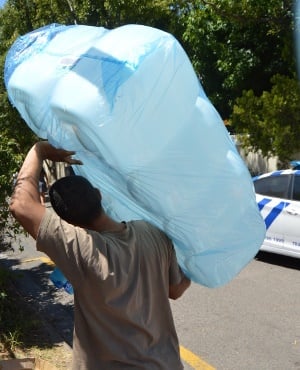
Cape Town - The decision to scrap Day Zero has left many people confused.
One day it was hovering on the horizon, the next it was gone.
Yet the dam levels are still dropping, there has been almost no rain, and the City of Cape Town says we are still in the midst of the worst drought we have experienced in recent times.
What happened? Why has Day Zero gone away suddenly?
Trawling through statements, opinions and conversations with people from different sectors, it appears that the decision was political, designed to limit the negative impact on tourism and investment in the city.
Severity of the water crisis
It certainly was not based on the fact that the water crisis is over. Dam levels are just over 22% of capacity. Everyone has seen photographs and television shots of the sandy bottom of the Theewaterskloof Dam, testament to the severity of the water crisis.
But in a city that relies on tourism as one of its major money-spinners and job creators, Day Zero was bad for business.
In January, when Day Zero was announced, the far greater danger was the real possibility that at the rate Cape Town was using water, demand really would outstrip supply and the city would run out of water. Tourism and other economic worries had to be put on a back burner, and Day Zero was born.
READ: Economy faces paralysis if govt doesn't act urgently on water crisis - report
It was a shock tactic and no one could have predicted with any certainty if it would work. It did.
Spurred into action by the fear that soon they would have to stand in queues to collect water in plastic containers, Capetonians rallied.
Water restrictions last year had already seen consumption drop, but the prospect of Day Zero, when you would not be able to flush your loo, sent water savings into overdrive. The result was that Cape Town’s water consumption dropped from over 600 million litres a day to 515 million.
Still not at the target of 450 million litres, but since February 2015 it had dropped from 1.2 billion litres a day to 510 million litres a day - probably a world record.
COLUMN: City of Cape Town betrayed farmers by surrendering Day Zero predictions
Coupled with water donations from farmers, and water savings from decreasing water pressure in pipes, by early March the heat was off for the moment, and the city council was able to push Day Zero further back until it was set to happen only in August.
What this did was give the authorities a breathing space.
Effect on tourism and investment
The politicians seized on this breathing space. On March 7 DA leader Mmusi Maimane announced that there would be no Day Zero this year - with the proviso that there were good rains and consumers continued to stick to 50 litres a day.
For now politicians could tell the world that Cape Town's Day Zero was gone.
The effect of Day Zero on tourism and investment in the city has not been quantified.
CEO of Wesgro Tim Harris acknowledges that because of the lag between booking and trips, the real effect of Day Zero would be felt only later.
"It's been a tough eight weeks. We as a tourism and economic promotion agency caught the worst of it. Our job is to say come to Cape Town, visit, invest, have conferences, and then there was the simplistic message playing out internationally of Armageddon here. But if Day Zero kept the taps open it was worth it," Harris said.
One fact that was quantified was that flights from the UK were down by 10% over the summer.
Wesgro did interviews with over 150 international journalists, trying to get the message of the "resilience of Capetonians across, plus the work by government and industry" into averting the crisis.
Harris believes they managed to "limit the damage" of Day Zero doom.
He welcomed that there would be no Day Zero this year. "For us in this industry we need certainty. The more certainty we can provide, the easier it is for Cape Town to compete with other places. The big change now is we can say to investors; tourists: 'The taps will stay open.'"
Construction industry
Fedhasa reports that there were booking cancellations over the season, but as Day Zero was pushed further back, these decreased.
In a Fedhasa survey, close on 50% of members said the 2017 season had not been as good as 2016, and 39% said they had been on a par.
Western Cape Premier Helen Zille has also said that while Day Zero helped save water, it had some "seriously negative consequences" for the economy.
"The idea of Day Zero hovering on the horizon has had a major effect on the big pillar of our economy, tourism. Visitors stay away from a city at risk of running out of water. Many also cancel their bookings. And this has a knock-on effect through the entire pipeline of tourism," Zille wrote.
She said the construction industry, which uses a lot of water, had also slowed down.
What has also emerged is that the reason for Cape Town's water crisis is not drought. There have been many droughts in the past that have not lead to Day Zero scenarios.
Bob Scholes, an internationally renowned systems ecologist at Wits, said Cape Town's demand had been increasing by 2% to 3% a year, and for years had been heading for a "cross-over point" where demand would outstrip supply.
"The key thing is that this increased demand is the 'new normal'. It is not going to go away."
The big unknown now, is with no Day Zero on the horizon, will Capetonians still save water as rigorously as they have done?
KEEP UPDATED on the latest news by subscribing to our FREE newsletter.
- FOLLOW News24 on Twitter




 Publications
Publications
 Partners
Partners























